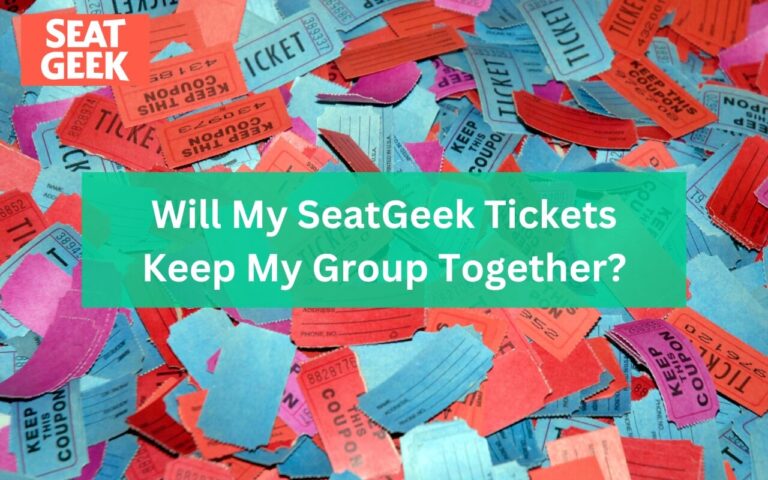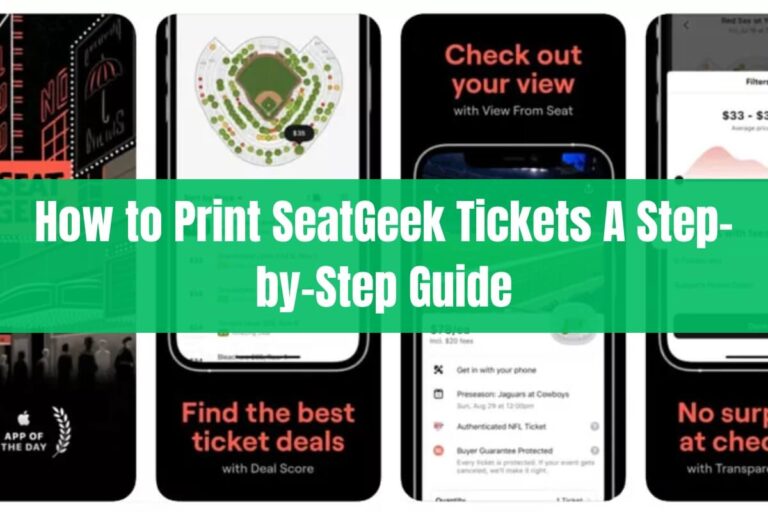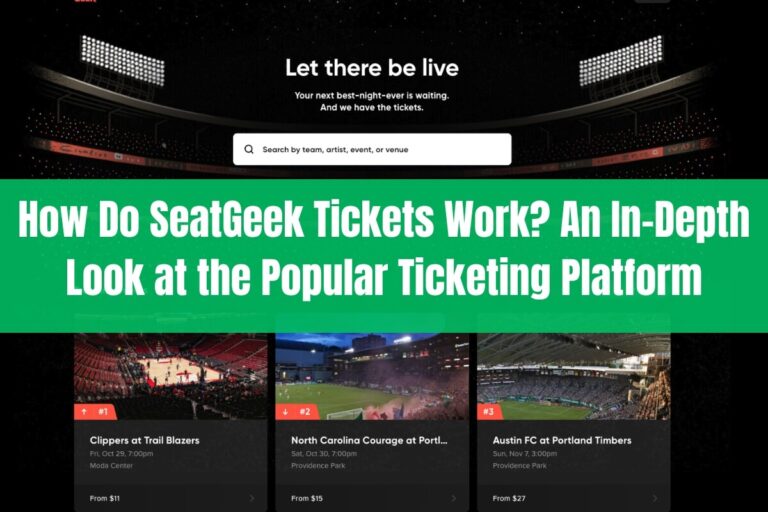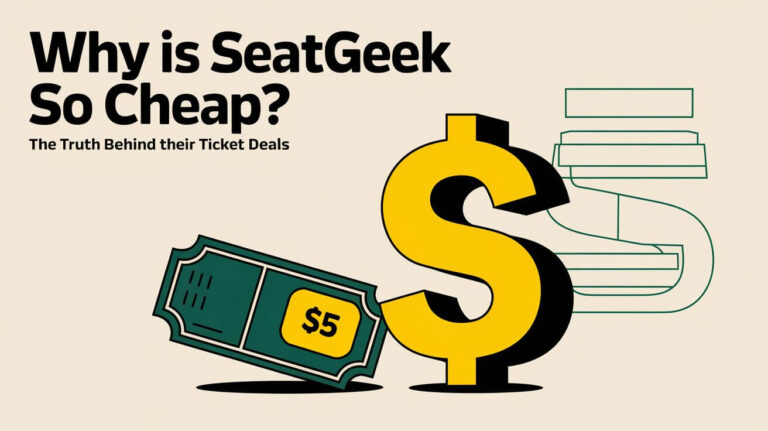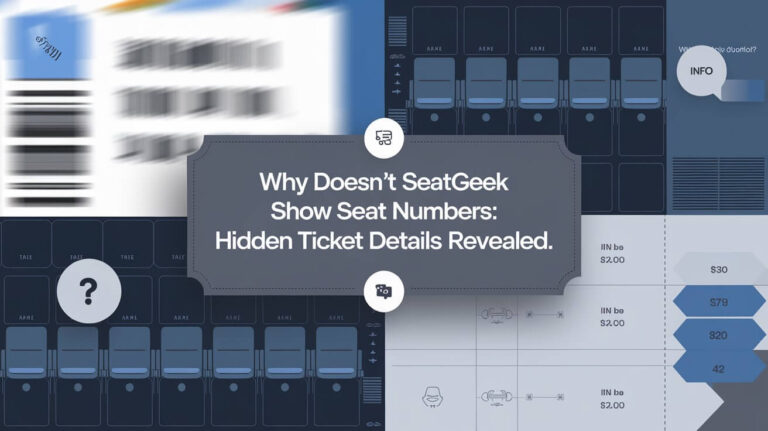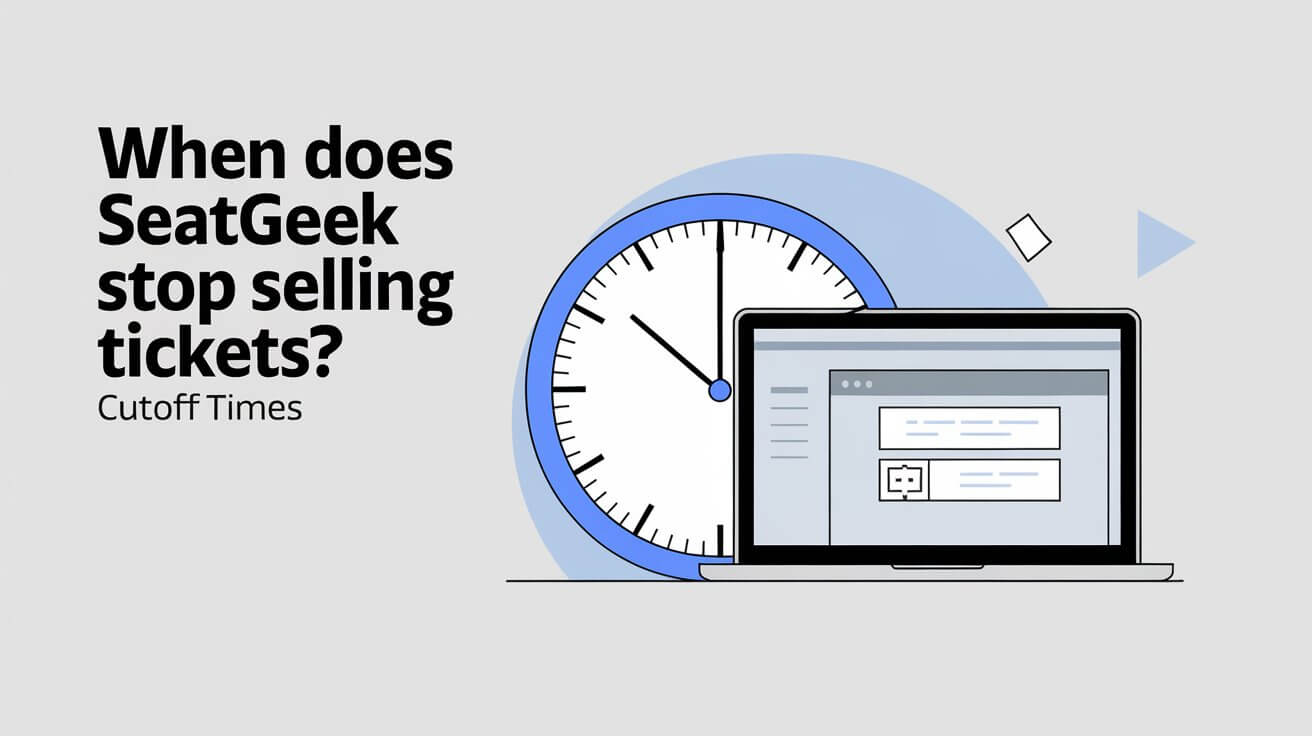
In the world of event tickets, timing is key. Many wonder, “When does SeatGeek stop selling tickets?” This guide will help you understand SeatGeek’s ticket sales timeline. It’s all about getting the best seats at the right price.
Learn how to navigate SeatGeek’s real-time inventory. Discover the secrets to finding the perfect tickets for your event.
SeatGeek Sales Timeline and Platform Overview
SeatGeek has grown a lot since starting in 2009. It got $500,000 to $1 million in seed funding in 2010. The company has raised more money over time, including $62 million in 2015 and went public in 2021 for $1.35 billion.
Brief History of SeatGeek
SeatGeek quickly became a big name in ticketing. It was named one of the Most Innovative Companies by Fast Company in 2018, 2019, and 2022. In 2020, it was also seen as a top influencer marketing brand by Insider.com.
Platform Features and Capabilities
SeatGeek is known for its easy-to-use search engine and mobile app. It helps with both primary and secondary ticketing. The company works with top sports teams, making it a leader in the industry.
Mobile App Integration
The mobile app is key to SeatGeek’s success. It lets users find and buy tickets easily. This focus on mobile has made SeatGeek a favorite for buying tickets on the go.
When Does Seatgeek Stop Selling Tickets
Many fans are excited to get their tickets for an event. They often wonder when SeatGeek stops selling them. Luckily, SeatGeek usually keeps selling tickets until the very end. This gives fans a chance to get the seats they want.
SeatGeek’s system updates ticket availability in real-time. It tries to let customers buy tickets until the event starts. But, the exact cut-off time can change. This depends on the venue, event rules, and digital transfer rules.
- Venue requirements: Some venues set deadlines for ticket sales. This helps with entry and event management.
- Event organizer policies: The event’s rules can also affect when ticket sales end on SeatGeek.
- Digital transfer restrictions: Some events limit digital ticket transfers. This might shorten the ticket buying window.
SeatGeek tries to sell tickets until the last minute. But, it’s smart to buy your tickets early. This way, you avoid missing out. Keep an eye on SeatGeek to get your tickets before they’re gone.
Ticket Availability Windows for Different Event Types
SeatGeek’s ticket availability windows change a lot for different events. Sports, concerts, and theater shows each have their own rules for buying tickets. It’s important to know these rules when you plan to go to an event.
Sports Events Ticket Sales
For sports events, you can usually buy tickets until the event starts. But, this can change based on the venue and who’s organizing the event. Season ticket holders might get special perks, like ADA seating up to 72 hours before.
But, ticket requests are usually not accepted 24 hours before the event starts.
Concert Ticket Purchase Deadlines
Concert tickets on SeatGeek have earlier deadlines than sports events. Venues and organizers might stop selling tickets a day or more before the show. This is to make sure everything runs smoothly.
So, fans should watch out for these early cut-off times when buying tickets.
Theater Performance Cut-off Times
Theater tickets on SeatGeek have the shortest window of all. Theaters often stop selling tickets 24 hours before the show. This is to manage ticketing and access.
When buying tickets through SeatGeek, always check the theater’s specific policies.
| Event Type | Ticket Availability Window |
|---|---|
| Sports Events | Up until event start, subject to venue and organizer policies |
| Concerts | Cut-off times typically a day or more before the scheduled performance |
| Theater Performances | Cut-off times as early as 24 hours before the show |
Knowing the ticket availability windows for different events helps SeatGeek users plan better. It makes managing seatgeek ticket availability and event-specific ticket sales easier on the platform.
SeatGeek’s Real-Time Inventory System
SeatGeek’s real-time inventory system keeps ticket availability up to date. This means users always have the latest options and prices. The system combines data from both primary and secondary market sellers. It gives a full view of ticket inventory from many sources.
The system watches and updates ticket availability all the time. This helps users make smart choices, even for last-minute buys. It lets event organizers, venue operators, and fans keep up with changes in the event world.
SeatGeek’s advanced algorithms and data integration offer unmatched seatgeek live ticket updates and real-time ticket availability. This level of transparency and quick response is a big change in event ticketing. It helps users get the best seats at the right price, even at the last minute.
“SeatGeek’s real-time inventory system is a true industry disruptor, revolutionizing the way people access and purchase tickets. It’s a game-changer that puts the power in the hands of consumers and event organizers alike.” -Nicholas Ticketing Industry Analyst
SeatGeek uses the latest technology and data insights to change the event ticketing world. It empowers users to make smart choices and enjoy easy ticket buying experiences.
Factors Affecting Ticket Sales Cutoff Times
Buying tickets can be tricky, with many things affecting when you can buy them on sites like SeatGeek. Knowing what these are can help you plan your event visit. It also makes buying tickets easier.
Venue Requirements
Venues set ticket sale end times for smooth entry and setup. This helps control crowds and check tickets. The time depends on the venue’s size, event, and security.
Event Organizer Policies
Event organizers set ticket sale deadlines. They want to start events on time and arrange seats well. These rules change based on the event type, like sports or concerts.
Digital Transfer Restrictions
Ticket platforms have rules on selling or transferring tickets near the event. These rules stop ticket trading and ensure tickets go to real fans. The time for digital transfers changes based on the platform and event.
| Ticket Sales Restriction | Event-Specific Cutoff Time |
|---|---|
| TickPick Hardstock Ticket Sales | 96 hours before the event |
| PDF Ticket Sales | Up to the start of the event |
| Electronic/Mobile Transfer Tickets | Up to the start of the event |
“Venue and promoter policies may impact when TickPick stops selling tickets, with restrictions sometimes imposed close to the event date.”
Understanding these factors helps plan ticket purchases. Knowing platform policies and event details makes buying tickets smoother.
Primary vs Secondary Market Sales Deadlines
SeatGeek works in both the primary and secondary ticket markets. The primary market is where tickets are sold directly by event organizers. The secondary market involves resales by individuals or platforms.
Deadlines for ticket sales differ between these markets. Primary market sales have earlier deadlines. This is because event organizers need to plan logistics and seating early. The secondary market, though, allows for last-minute buys, giving buyers more flexibility.
- Primary ticket sales often close weeks or months before the event.
- Secondary market cutoffs are more flexible, sometimes until the event day.
Last-minute buyers might find better deals on the secondary market. But, secondary market tickets can have extra fees. There’s also a risk of fake or invalid tickets.
“Ticket prices for Taylor Swift’s Eras Tour range from as low as $311 for certain shows to as high as $2,440 for others on resale sites like StubHub.”
Primary and secondary market sales understanding benefits buyers. It helps them find the best tickets and make informed choices.
Digital Ticket Transfer Time Limits
SeatGeek has made ticket management easy in the digital age. Their system lets you quickly share mobile tickets with others. But, remember, there are time limits for these transfers, which get tighter as the event nears.
Mobile Ticket Processing Times
SeatGeek’s app makes transferring tickets fast, with delivery to the recipient in minutes. This is great for last-minute changes. Yet, as the event gets closer, processing times might get longer due to more demand.
Last-Minute Purchase Options
SeatGeek also has options for buying tickets just before the event. These mobile tickets are sent right away, making it easy to get your tickets. But, availability and prices might drop as the event starts.
Familiarizing yourself with digital ticket transfer limits and last-minute purchase options can enhance your SeatGeek experience. This way, you can enjoy your event without stress.
Event Day Purchase Restrictions
Buying tickets through SeatGeek on event day can have rules. These rules depend on the venue and the event organizer. It’s key to know these limits before the event.
Many events let you buy tickets until the event starts. This gives fans a chance to get seats even at the last minute. But, some events might stop selling tickets earlier. This is to manage entry and crowd control better.
Venue-Specific Policies
It’s important to check the venue and event rules for last-minute ticket buys. Big stadiums might have strict deadlines for sales. This helps with entry and crowd control.
Theater shows might be more flexible with their ticket sales. They might let fans buy tickets closer to the showtime.
| Venue Type | Day-of-Event Ticket Sales Cutoff |
|---|---|
| Major Stadium | 2 hours before event start |
| Theater Performance | 30 minutes before showtime |
Knowing these specific rules helps fans plan better. It ensures a smooth experience on event day.
Venue-Specific Sales Policies
When you buy tickets on SeatGeek, knowing the venue’s rules is key. Each place, from big stadiums to small theaters, has its own ticket sales rules. Knowing these rules helps make buying tickets easy and fun.
Major Stadium Guidelines
Big sports places like SeatGeek Stadium let you buy tickets close to the event. They need 72 hours’ notice for any last-minute changes. They also have rules for cash, alcohol, bag sizes, and cameras.
Theater Venue Regulations
Theaters have tighter rules for buying tickets. You often need to buy them days or weeks before. This helps the theater get everything ready for a smooth event.
SeatGeek’s site works with these rules to help you. It makes sure you know the ticket sales policies. This way, buying tickets is easy and fun for everyone.
| Venue Policies | Major Stadiums | Theater Venues |
|---|---|---|
| Ticket Sales Deadline | More Flexible | Stricter |
| Onsite Amenities | ATMs, Concessions, Alcohol Service | Limited |
| Camera/Recording Policies | Restricted | Stricter |
| Entry/Exit Procedures | Multiple Access Points | Centralized |
Price Fluctuations Near Event Time
Ticket prices on SeatGeek can change a lot as the event gets closer. This change is because of how much people want tickets and how many are left. For big events with few tickets left, prices might go up. But for less popular events, prices could drop to get more people to buy.
Concert-goers can save a lot by buying tickets on the day of the event. They can save up to 33%. Buying the day before can save 27%. Festival pass prices can also drop, being 30% lower 13 days before and 24% lower 12 days before.
But, the trend isn’t always the same. Tickets bought three months before can cost almost 14% more than the average. Also, only 3% of festival pass sales happened on the two cheapest days. This shows that the best time for deals can change.
Key Questions
When does SeatGeek stop selling tickets?
SeatGeek usually sells tickets until the event starts. But, the exact time can change. This depends on the venue, event organizers, and digital transfer rules.
How does SeatGeek’s ticket sales timeline work?
SeatGeek’s system lets you buy tickets right before the event. But, tickets might run out fast. The time you can buy tickets varies by event type.
What factors affect SeatGeek’s ticket sales cutoff times?
Several things affect when SeatGeek stops selling tickets. These include venue rules, event organizer policies, and digital transfer rules. These can change, leading to different cutoff times for each event.
How do primary and secondary market sales differ on SeatGeek?
SeatGeek works in both primary and secondary markets. Primary sales, from event organizers, might have different times than secondary resales. Secondary sales often go on until the event starts.
What are the time limits for transferring tickets on SeatGeek?
SeatGeek’s system for transferring tickets is quick. But, there might be time limits, close to the event start.
Are there any day-of-event ticket sale restrictions on SeatGeek?
Some events on SeatGeek might have rules for selling tickets on the day of the event. These rules can change based on the venue and event organizers.
How do venue-specific sales policies affect SeatGeek’s ticket offerings?
Each venue has its own ticket sales rules that SeatGeek must follow. Big stadiums might allow sales closer to the event. But, theaters might have earlier cutoffs.
How do ticket prices fluctuate on SeatGeek as the event time approaches?
Ticket prices on SeatGeek can change a lot as the event gets closer. This is because of demand and how many tickets are left. Prices might go up for events that are in high demand.

